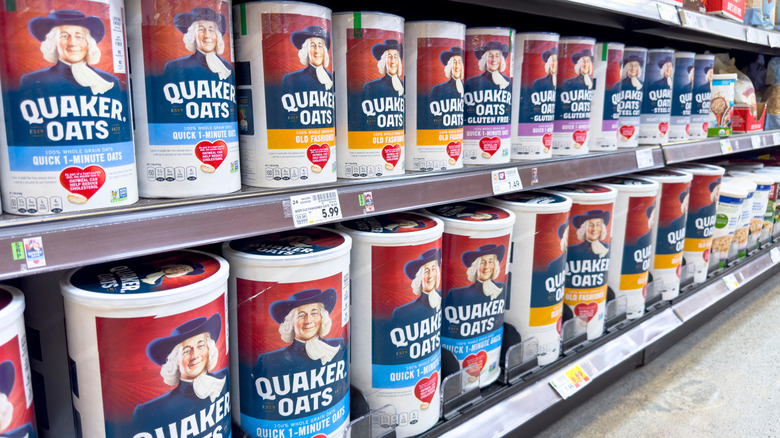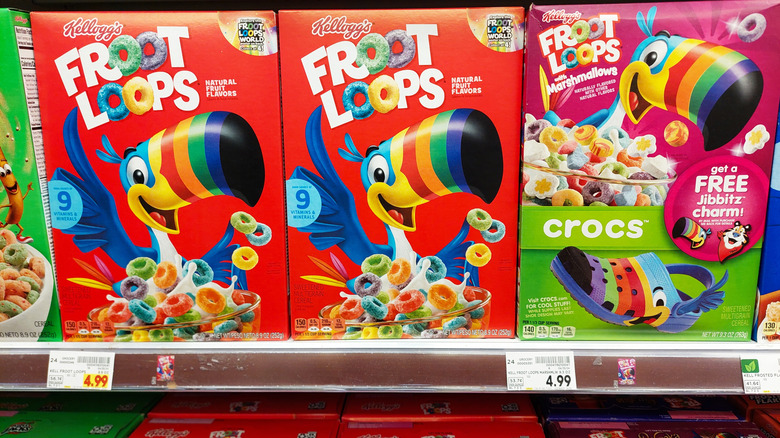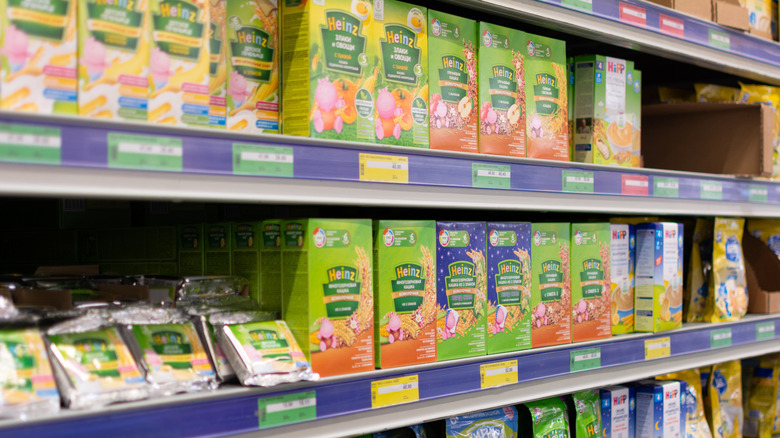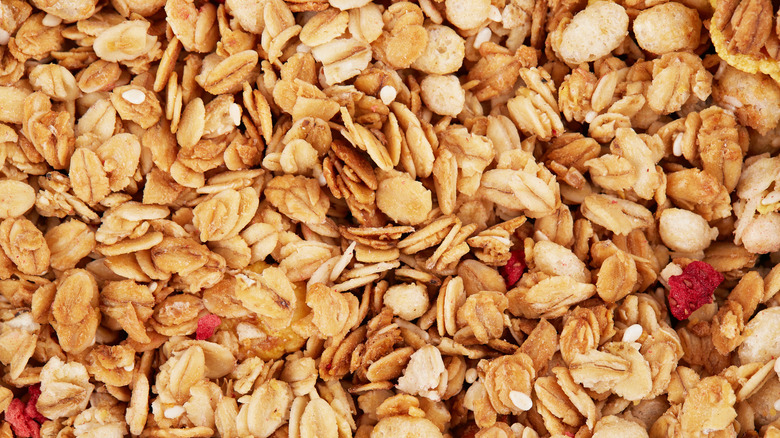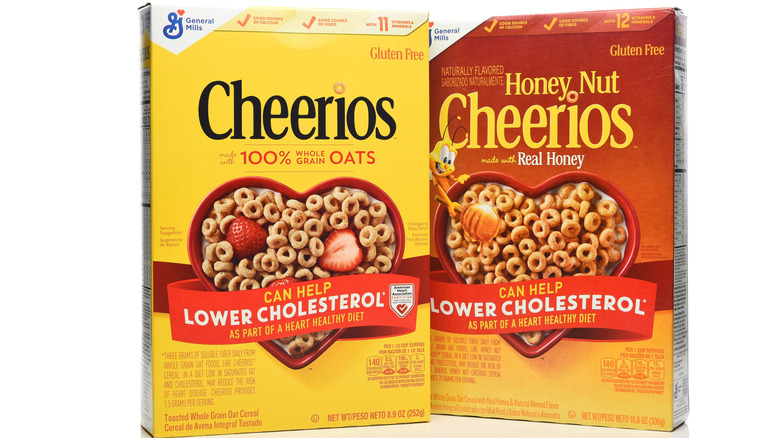These Are The Worst Cereal Recalls In US History
You'd think cereal would be one of the safer foods out there. However, it has suffered from problems ranging from bacterial contamination to inclusion of foreign matter. Several brands of cereal have been the subjects of recalls since records were first kept in the 1970s, and while most causes are due to contamination in one form or another, some products have to be recalled for different reasons.
Cereal recalls are usually monitored by the U.S. Food and Drug Administration (FDA), with the Centers for Disease Control and Prevention (CDC) stepping in if food poisoning is involved. As of writing, the FDA is still able to announce recalls that affect health and safety across the country, and you can search for recalls on the FDA's website. If you want to know what some recalls were like in previous years, you can now check out this list of the worst cereal recalls in U.S. history.
Quaker Oats in 2023-2024
In December 2023, Quaker Oats recalled 43 granola products for potential salmonella contamination. The list mentioned not only granola bars, but also granola cereal, as well as Frito-Lay variety products that included Quaker granola bars. Tests in November and December 2023 did find the bacteria in some products; the November tests may have contained errors, but the December tests confirmed the result. The recall was nationwide, even extending to Saipan, Guam, and Puerto Rico. While the recall was issued before any cases of salmonella were reported, it was large enough (and affected so many kid-friendly products) that it caused quite a stir — but that was just the beginning.
In January 2024, Quaker announced an expansion of the recall to cover an additional 25 products. This time, the list included several Cap'n Crunch cereal bar products, several oatmeal products, and other products sold under the brands Gamesa Marias, Munchies, and even Gatorade. One more granola bar was added to the list later in January, although this bar had already been discontinued. While the exact number of units or boxes recalled wasn't made public, the recall was so big that Quaker's operating profit dropped 19%. The contamination was traced to one plant in Danville, Illinois, which Quaker closed in April 2024. In June of that year, the FDA revealed a series of violations dating back to 2020 at that same plant.
Honey Smacks in 2018
The Quaker salmonella problem was found before anyone reported getting sick, but that's not always how these issues are discovered. In May 2018, the FDA heard about a cluster of salmonella infections that were all due to the same strain. Tests traced the problem back to Honey Smacks cereal made at a third-party plant, and Kellogg's issued a recall notice in June 2018 for two specific products that both had the same best-by date. A total of 1.1 million products were initially recalled, but as you can guess, that was just the start.
Over the next couple of months, additional people reported illness. By mid-July, over 100 people had gotten sick, and by September, that number grew to 135 across more than 30 states, including many hospitalizations. The recall expanded to include all Honey Smacks cereal, regardless of when it was sold or what best-by date it had. The recall was nationwide and international, affecting consumers in places like Tahiti and Central America, and the FDA advised washing down shelves that held the product. Unfortunately, the FDA encountered a problem: some stores wouldn't stop selling the cereal, and the department had to remind sellers it was illegal. In 2023, the FDA fined Kerry — the third-party manufacturer — $19.2 million dollars related to unsanitary production conditions.
Four different cereals from Malt-O-Meal in 1998, 2008, and 2009
Malt-O-Meal makes instant oatmeal and several versions of classic dry cereals that are sold both under that brand and as store private brands. In 1998, the toasted-oat dry cereals that the company made were recalled. This came after the FDA learned about a salmonella outbreak that was eight times larger than the total number of cases in the region over the previous four years. The illnesses were traced back to Millville toasted oats (made by Malt-O-Meal) that had been sold at Aldi, but the company recalled all versions of its toasted oats cereals just to be safe. Over 200 people became sick with several hospitalizations reported, so the company wasn't taking chances.
In 2008, the FDA learned of another outbreak. This one was due to Salmonella agona, the same strain that was responsible for the 1998 salmonella outbreak. This time, the recall affected puffed rice and puffed wheat cereals, and it again resulted in several people being hospitalized. Cases were scattered across the Upper Midwest and Northeast, with a case also cited in Colorado. Luckily, no deaths were reported.
In 2009, the company had to recall yet more cereals; this time, instant maple and brown sugar oatmeal was the problem. However, the culprit wasn't the oatmeal itself, but the dry milk powder made by a third party. The FDA had found salmonella in the plant where the milk powder was made, resulting in a precautionary recall.
Three types of Cap'n Crunch in 1993
Sometimes, it's not the cereal itself that's the problem; instead, it's the prize that the cereal company included in the box. In 1993, Quaker had to recall Cap'n Crunch, Cap'n Crunch with Crunchberries, and Cap'n Crunch Peanut Butter Crunch because the toy the company added to the boxes was injuring children's eyes. The toy was a "popper," which looked like half of a hollow rubber ball. You could press the half down onto a surface, after which the toy would pop up into the air — but if you pressed the half onto the surface with the rounded side up, you could create a suction effect.
Unfortunately, little kids were placing the half over their eyes, unaware that this would create suction that could cause injury. Quaker received 36 reports of bruising or bloodshot eyes in early 1993, leading the company to issue a recall of over 8.3 million boxes of cereal. Unfortunately, not everyone threw out their packages because you can find unopened boxes of the cereal and the toys themselves for sale on auction and collection sites.
Various Kellogg's cereals in 2000
A smaller but still substantial prize recall affected a few different Kellogg's brand cereals in 2000. Kellogg's had included Hot Wheels cars as prizes in its cereal boxes since the 1980s, continuing the trend until 2003. However, in 2000, one particular version had a manufacturing defect that could lead to a choking risk, and over 837,000 units were recalled.
A version of the Nascar Pull'N Go Hot Wheels cars (yellow and red, white hood, labeled with "5" and "Terry Labonte" on the roof) had tires that would fall off. The company received two reports of this happening and issued a recall before any injury reports were made; young children could easily try putting those wheels or the toy car in their mouths, potentially leading to choking or other injury. The cars were packed in cereals like Crispix, Froot Loops, and Mini-Wheats, as well as variety packs of cereal. Kellogg's offered replacement cars to those who sent in the defective versions.
Cheerios in 1987
A huge cereal toy-prize recall occurred in 1987 when General Mills had to recall over 15 million boxes of Cheerios — and this one did unfortunately result in the death of a child plus four reports of potential close calls. The company had included something called a Powerball in the boxes, which had to do with small items that children could choke on.
The company received a report of a one-year-old child choking to death on the ball and four reports of young children placing the balls in their mouths. Fortunately, those four children were not injured. The ball actually wasn't a new toy; similar balls had been used as prizes for years and met Consumer Product Safety Commission standards. General Mills said that the ball had even been designed to exceed standards for safe sizes for younger children and then tested by a third party lab. However, the company was quick to recall 10 million boxes that had been sold, as well as 5 million other boxes that were still on the shelves because it didn't want to risk additional injuries.
Mini-Wheats in 2012-2013
Many recalls are due to foreign-matter contamination, which is when something that isn't meant to be in the cereal ends up in a batch. In 2012, Kellogg's had to recall 2.8 million boxes of Mini-Wheats because small metal mesh fibers may have been mixed in with the cereal. There was a faulty part on manufacturing equipment in a plant, and the company recalled the boxes before any injuries were reported. Spokespeople claimed the chances of metal actually being in the cereal were low.
This recall resulted in consumer anger because the company announced the recall on a Monday, but the news didn't reach many people until three days later. The recall affected both frosted and unfrosted versions in several different sizes of boxes. A few consumers took to YouTube to test the cereal they had with magnets and were surprised to find bits and pieces of the wheat itself sticking to the magnets (They didn't find any bits of metal mesh). However, comments on each video suggested that this was due to either static electricity or to the supplemental iron used to fortify the cereal.
Special K in 2013
A smaller but rather alarming recall happened in 2013, when Kellogg's had to recall 36,000 boxes of Special K Red Berries for glass-shard contamination. No injuries were reported; the company issued the recall out of caution because they found one batch that was actually contaminated. Consumers were asked to contact the company for a replacement coupon and to possibly send the product back to Kellogg's if the company decided to do more investigating.
What really made this alarming (aside from the terrible mental imagery it produces) is that, apparently, the company heard about the glass from consumers after reports made their way around the country. Surprisingly, many consumers weren't that alarmed; according to one news report, some even planned to continue eating the cereal, even though they checked the boxes they had. Kellogg's did act quickly, but it's a reminder to check any products you buy (from any brand) before taking a bite.
Heinz instant dry baby cereal in 1975
Food recalls are, historically speaking, a relatively recent phenomenon. The CDC didn't start tracking food illness outbreaks until 1970, and the first major food recall didn't occur until 1973 when more than 75 million cans of mushrooms were recalled. The first known cereal recall after that affected Heinz instant dry baby cereals in 1975 when the company announced a recall of all its instant dry baby cereals due to potential metal contamination.
However, that recall actually wasn't the first report that the company was investigating contamination in the cereal. The company stopped shipping all baby cereals in December 1974 when it started investigating its rice cereal products — a tiny, one-sentence blurb at the bottom of page 28 of the 12/25/74 edition of "The New York Times" was all that announced that there were "twisted metal slivers" in two boxes. Later reports stated that two consumers had found the slivers in cereal sold in North Carolina in what was apparently an unrelated problem; the company traced the problem back to metal filings accidentally dropped into a production tank during equipment repair. However, it's unclear if a recall was ever announced.
Beech-Nut baby cereal in 1986 and 2021
Heinz was not the only baby cereal to be subject to recalls. Beech-Nut has had its share of problems with two contamination recalls over 35 years for different cereals. The first was in 1986, when the company recalled over 6,000 cases of baby cereal due to contamination with paint chips. The second was in 2021, when the company recalled rice baby cereal because testing done in Alaska had found excessively high levels of arsenic in the product.
Arsenic's presence in rice has been a long-standing problem. All rice has been found to contain varying levels of arsenic, some of which is naturally occurring. The rest is due to prior industrial use that leached arsenic into the soil and water used for agriculture. Beech-Nut said the rice flour used in the recalled baby cereal had tested below safe limits, but recalled the products after the test found higher levels in the mix that was sold. After the 2021 recall, Beech-Nut announced that it would stop making the single-grain rice cereal due to concerns that it couldn't guarantee a supply of rice flour that consistently tested below the limits for arsenic.
Just Right in 1986
Non-baby-food cereals continued to deal with metal contamination into the 1990s. Just Right was a brand of cereal from Kellogg's that was discontinued in the U.S. in the 1990s (it's still sold in Australia). In 1986, consumers in Tennessee reported finding metal shavings in a few boxes, prompting Kellogg's to issue a recall impacting almost 44,000 boxes of cereal. The company thought the cause might be related to some drilling that took place near manufacturing equipment.
Even though it was recalling the cereal, Kellogg's said that eating the product wouldn't be harmful. The reasoning was that doctors had told the company that the metal bits were so small that they could be digested. Weirdly enough, some metal can get through your system without a problem. In fact, Seattle Children's Hospital suggests that children who have swallowed coins the size of quarters may be a problem, but smaller coins may pass through without issue. Of course, the problem with metal shavings is that they have the potential to be sharp, but Kellogg's reported no other problems with the cereal.
Dakota Specialty Milling/Blue Planet/Heartland granola in 2013
Imagine you run a food company and find out that your flour supplier has issued a recall. Now, you have to do so, too, for every product that used that flour. That happened to several companies after Dakota Specialty Milling announced a recall of flour and grains for metal fragment contamination in 2013. The company supplied flour to brands like Mondelez and Frito-Lay, and said that this was the first recall it ever had to issue in over 40 years of operation.
The milling company supplied granola to Heartland and Blue Planet, and those two companies issued notices for cereal recalls, rather than relying on consumers to figure out that Dakota was the supplier. Dakota said the problem had to do with a defective screen on its equipment. Over 2.5 million pounds of Blue Planet products were recalled; no number was available for Heartland granola.
Apple Jacks, Honey Smacks, Corn Pops, and Froot Loops in 2010
So far, we've seen problems with bacterial and foreign-matter contamination, along with defective toy prizes. Those aren't the only things that can create problems with cereal boxes, though — in 2010, Kellogg's found out the hard way that the packaging itself can be a problem. The company had to recall 28 million boxes of Apple Jacks, Honey Smacks, Corn Pops, and Froot Loops because customers complained about a bad smell and taste from each cereal. It turned out that the wax paper liner in the boxes — those bags that contain the cereal — were the cause of the rancid odor and taste, with the cereal absorbing it all.
Kellogg's removed the wax paper liners from its production lines and recalled the cereal boxes after receiving about 50 reports about the taste and odor. Five people reported feeling sick, including becoming nauseous and feeling numbness in their mouths for a day.
Cheerios and Honey Nut Cheerios in 2015
A lot of recalls have to do with unlabeled ingredients and potential allergens. Those may not affect people who aren't allergic to or sensitive to the substance in question, but they can be dangerous for anyone who is — companies will still issue recalls for things as seemingly basic as unlabeled milk. Sometimes, the problem is more urgent because the inclusion of the unlabeled ingredient directly contradicts what the packaging says. In 2015, General Mills faced that exact problem when it had to recall 1.8 million boxes of regular Cheerios and Honey Nut Cheerios because of unlabeled wheat used in products that were labeled as gluten-free.
The company said wheat flour was accidentally added into the production lines for these products, which are not supposed to contain wheat. Gluten is a protein in wheat that creates problems for people with a few conditions, notably celiac disease and gluten intolerance. If someone with one of these conditions eats wheat, the gluten can make them very ill. The company did receive two complaints about illness and said that it had located more complaints online.

